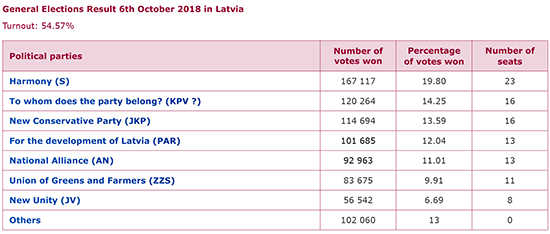Results
Elections in Europe
Corinne Deloy
-

Available versions :
EN

Corinne Deloy
Harmony (S), a left leaning party led by Nils Usakovs came out ahead in the general elections on 6th October in Latvia. The party won 19.8% of the vote, taking 23 seats (-1 in comparison with the previous election on 4th October 2014) in the Saeima, the only house of Parliament.
To whom does the country belong? (Kam pieder valsts? KPV?), a populist party founded in May 2016 by former actor and present MP Artuss Kaimins, came 2nd with 14.25% of the vote and 16 MPs. It is followed by the New Conservative Party (JKP) led by former Justice Minister (2012-2014) Janis Bordans, with 13.59% of the vote and 16 seats.
The liberal electoral alliance, For the Development of Latvia (PAR), founded on 26th April last came 4th with 12.04% of the vote and 13 seats, followed by the National Alliance (AN), a member of the outgoing government, which rallies the Union for the Fatherland and Freedom (TB/LNNK), led by Gaidis Berzins, and All for Latvia (VL), a rightwing party led by Ratvis Dzintars (11.01% of the vote and 13 seats, -4). The Union of Greens and Farmers (ZZS), the party of outgoing Prime Minister Maris Kucinskis, won 9.91% of the vote and 11 seats (-10), New Unity (JV), led by MEP Krisjanis Karins, 6.69% of the vote and 8 seats (-15).
Harmony won in two of five electoral constituencies, Latgale and Riga, "To whom does the country belong?" came out ahead in the two constituencies of Zemgale and Kurzeme and the New Conservative Party won in Vidzeme.
Turnout was the lowest ever recorded in Latvia's history. It totalled just 54.57% i.e. 4.27 points less than in the previous general election on 4th October 2014.
"There is no possible coalition combination that will be stable and able to govern without Harmony," declared Nils Ushakovs, the party's leader on the announcement of the results.
The leader of "To whom does the country belong?" Artuss Kaimins declared during the electoral campaign that he was prepared to work with any of the parties, but he did however address contradictory message about forming an alliance with Harmony. However, in all the two parties only have 39 MPs, i.e. 12 short of the absolute majority.
"To whom does the country belong?" is extremely critical of the elites, which in its opinion are only interested in money and staying in power. The party is not offering a specific programme, but it promising to increase the number of infants' schools, the amount spent on healthcare and to reduce the number of civil servants. Its populist discourse and its candidates, who are new in the political arena, have succeeded in attracting a great number of voters, who are extremely discontent with their political leaders, who they believe to be corrupt and inefficient. "There is a strong anti-establishment feeling in Latvia as well as a strong desire for something new. If we look elsewhere we can see the same thing happening in many European countries," declared Arnis Kaktins, director of the pollster SKDS. "To whom does the country belong?" has succeeded in convincing many Latvians that the leading classes have corrupted the State and that no change will occur in Latvia before the latter are chased from power and replaced," stresses Una Bergmane, professor of Political Science at the London School of Economics (LSE). "Voters have sent us the following message: we want to see new faces and we are not satisfied with the way the country's issues are being dealt with," maintains Janis Ikstens, a political expert at the university of Latvia.
In the past Harmony has already come out ahead twice in the general elections in Latvia (in September 2011 and in October 2014) but it has never entered government, because most of the other parties refuse to work with a movement that it considers too close to Russia.
Harmony likes to define itself to represent "social democracy" and has put forward several personalities of "Latvian origin" on its lists, and recently broke the cooperation agreement it had with United Russia (ER), the party of Russian President Vladimir Putin. However, it is not certain that this will enable it to reach office.
With 7 parties entering the Saiema will be extremely segmented. The coalition possibilities are multiple and the parties against participation by Harmony in government will do everything so that once again, they will prevent this party from entering office.
"The initiative to engage in discussions in view of a coalition must come from the centre right," indicated the chair of the Unions of Greens and Farmers, Augusts Brigmanis when the results were announced. The re-election of the right-wing government is still the privileged option by many political analysts.
Moreover, the head of the Latvian State, Raimonds Vejonis, indicated during the electoral campaign that he preferred the solution of continuity. There is therefore little chance that he will appoint former minister Vjaceslavs Dombrovskis, Harmony's candidate as Prime Minister or Aldis Gobzems, the candidate of "To whom does the country belong?"
On the same theme
To go further
Elections in Europe
Corinne Deloy
—
20 January 2026
Elections in Europe
Corinne Deloy
—
13 January 2026
Elections in Europe
Corinne Deloy
—
4 November 2025
Elections in Europe
Corinne Deloy
—
28 October 2025

The Letter
Schuman
European news of the week
Unique in its genre, with its 200,000 subscribers and its editions in 6 languages (French, English, German, Spanish, Polish and Ukrainian), it has brought to you, for 15 years, a summary of European news, more needed now than ever
Versions :




